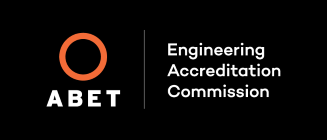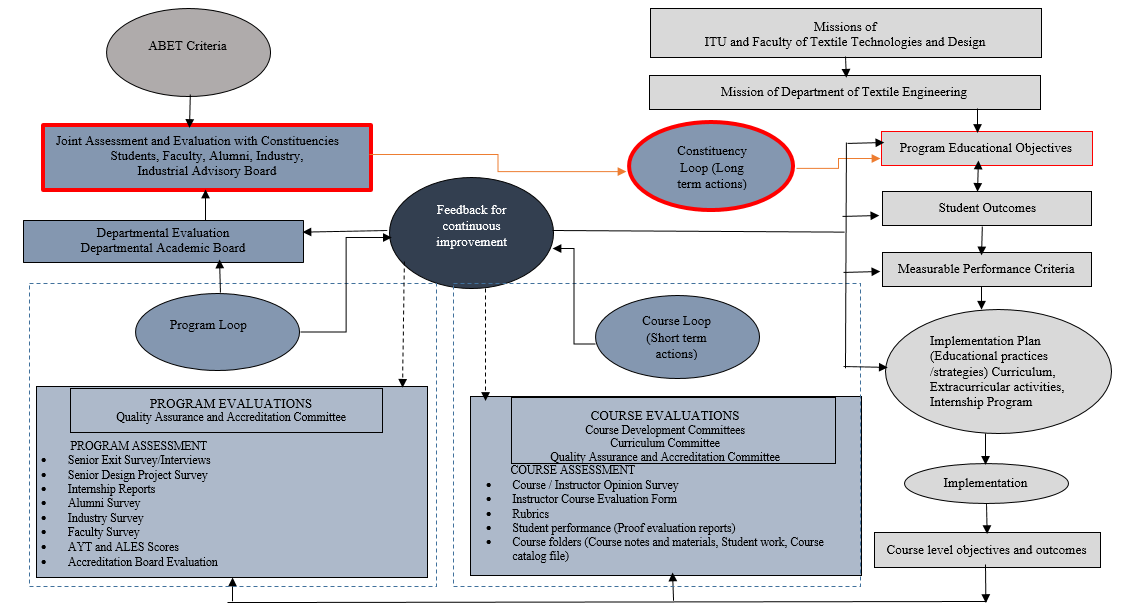
ITU Textile Engineering Undergraduate Program is an accredited program by ABET Engineering Accreditation Commission (EAC), www.abet.org, (Criteria: General Criteria Only (EAC)).
Related Links:
Mission of Textile Engineering Undergraduate Program
Through providing contemporary education and research & development opportunities at international level, to educate pioneer and creative textile engineers, fashion designers and textile marketing associates who can employ their professional knowledge and skills to meet the requirements of and contribute to humanity, society and industry, and keep updated with scientific and technological developments, and who are conscious of the social, ethical and economical aspects and responsibilities of their profession, and to serve in advancing national and industrial developments through basic, applied and multidisciplinary researches within the fields of textiles.
Program Educational Objectives
The program educational objectives for the Textile Engineering Undergraduate Program are as follows:
To educate engineers who:
-
PEO1: Our graduates will manage textile production processes and identify and solve textile engineering problems.
-
PEO2: Our graduates will take effective roles in the organization of textile businesses both globally and locally.
-
PEO3: Our graduates will perform multidisciplinary design activities that result in desired textile-based products, systems, or processes that support care of the environment and health and that provide economy, wealth, and quality.
-
PEO4: Our graduates will engage in both life-long learning and continuous self improvement, follow scientific and technological developments, and initiate or conduct research and development activities in the field of textile engineering.
Student Outcomes (1 to 7)
-
An ability to identify, formulate, and solve complex engineering problems by applying principles of engineering, science, and mathematics.
-
An ability to apply engineering design to produce solutions that meet specified needs with consideration of public health, safety, and welfare, as well as global, cultural, social, environmental, and economic factors.
-
An ability to communicate effectively with a range of audiences.
-
An ability to recognize ethical and professional responsibilities in engineering situations and make informed judgments, which must consider the impact of engineering solutions in global, economic, environmental, and societal contexts.
-
An ability to function effectively on a team whose members together provide leadership, create a collaborative and inclusive environment, establish goals, plan tasks, and meet objectives.
-
An ability to develop and conduct appropriate experimentation, analyze and interpret data, and use engineering judgment to draw conclusions.
-
An ability to acquire and apply new knowledge as needed, using appropriate learning strategies.
Continuous Quality Improvement Loops in the Textile Engineering Undergraduate Program

Annual enrollment and graduation numbers (2009-2022)
| Academic Year |
University Entrance Exam |
Number of New Enrollments |
Number of Total Enrollments |
Number of Graduated Students |
| Numerical Score |
Rank |
| Min. |
Max. |
Min. |
Max. |
Average |
| 2022-2023 |
464,028
|
506,805 |
44630
|
13309
|
28970
|
62 |
388 |
|
| 2021-2022 |
391,319 |
448,309 |
50794 |
12685 |
31740 |
62 |
415 |
41 |
| 2020-2021 |
453,216 |
482,889 |
51787
|
27599
|
39693 |
62 |
444 |
65
|
| 2019-2020 |
411,510 |
452,799 |
55985 |
28564 |
42275 |
62 |
466 |
95 |
| 2018-2019 |
348,872 |
414,948 |
93029 |
42909 |
67969 |
60 |
446 |
65 |
| 2017-2018 |
355,195 |
400,388 |
79905 |
45204 |
62554 |
60 |
419 |
57 |
| 2016-2017 |
367,442 |
426,08 |
72019 |
33281 |
60678 |
69 |
|
62 |
| 2015-2016 |
351,534 |
390,452 |
62252 |
36842 |
55322 |
72 |
|
55 |
| 2014-2015 |
361,106 |
422,358 |
61705 |
28052 |
53652 |
72 |
|
43 |
| 2013-2014 |
357,841 |
442,631 |
60792 |
23900 |
52495 |
71 |
|
48 |
| 2012-2013 |
398,057 |
439,671 |
53059 |
30852 |
46333 |
72 |
|
55 |
| 2011-2012 |
422,291 |
477,973 |
54595 |
25166 |
46648 |
71 |
|
65 |
| 2010-2011 |
423,638 |
477,096 |
58796 |
27477 |
47081 |
71 |
|
52 |
| 2009-2010 |
319,444 |
335,984 |
42670 |
21929 |
35635 |
72 |
|
50 |
Course Plan
Advisory Board
3 members from the Board of Istanbul Textile and Raw Materials Exporters' Association (İTHİB)
|
3 members from the Board of Istanbul Ready-to-Wear and Apparel Exporters' Association (İHKİB)
|
3 members from the Board of the Turkish Clothing Manufacturers Association (TGSD)
|
2 members from the Board of Directors of the Turkish Textile Industry Employers' Association (TTSIS)
|
2 members from TMMOB Chamber of Textile Engineers Board of Directors
|
| 2 members from ITU Textile Engineering Department Graduates |